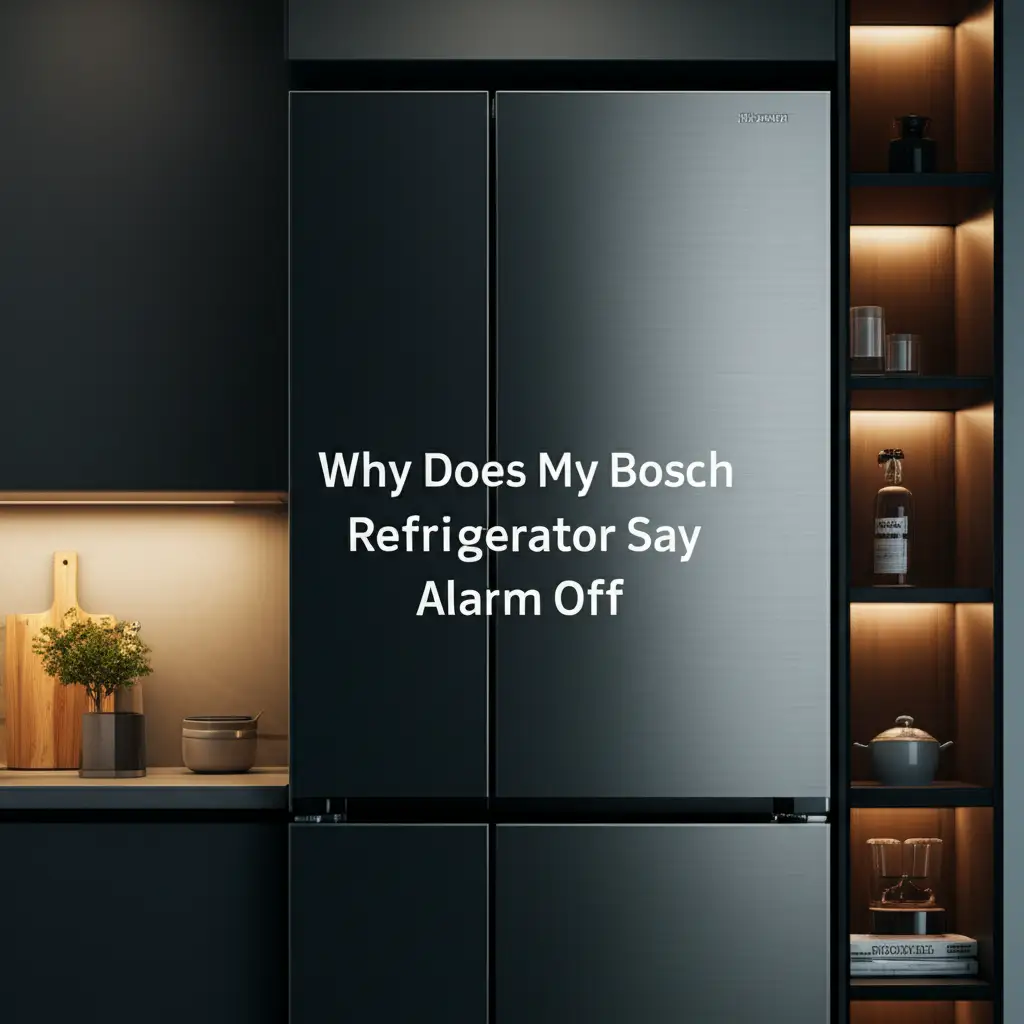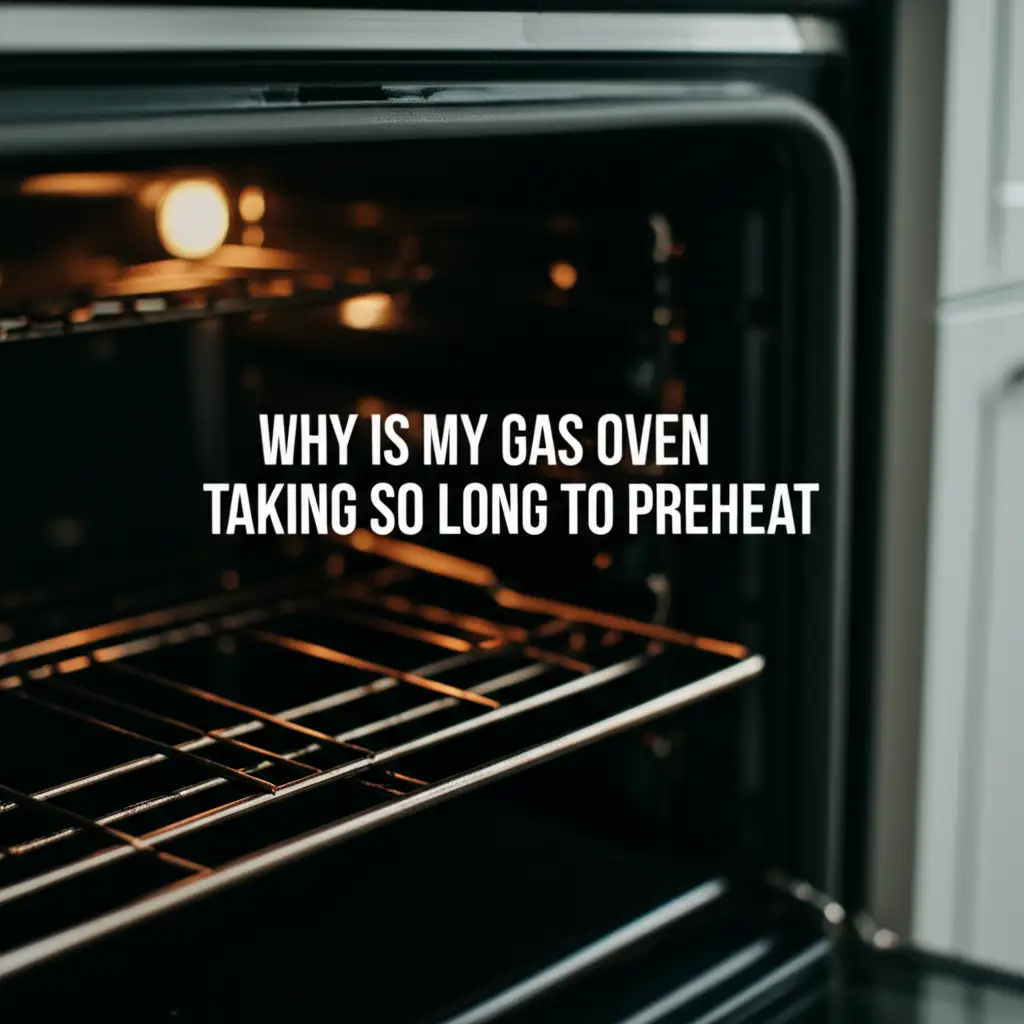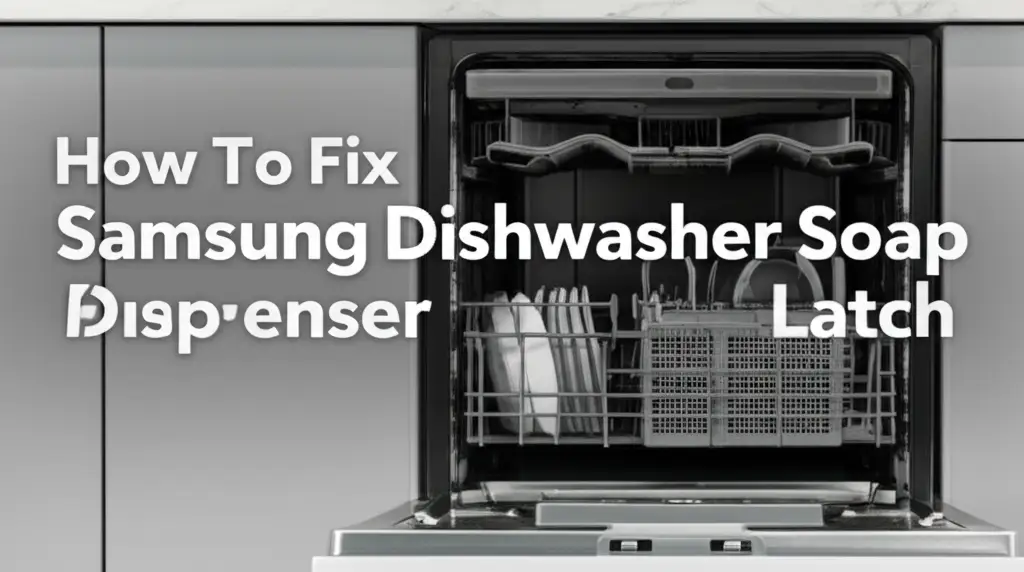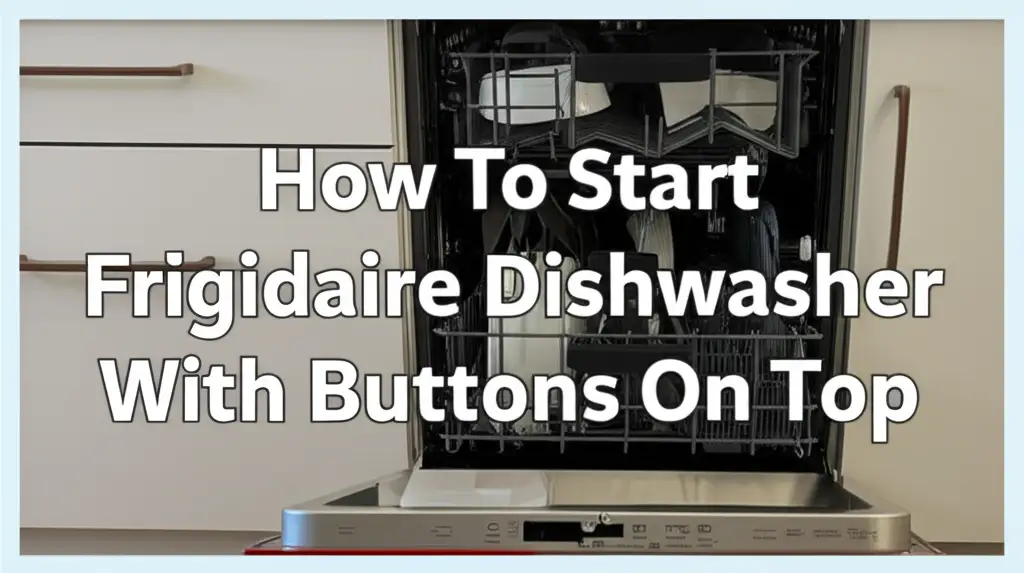· Todd Martin · Home Appliances · 17 min read
Why Does My Bosch Refrigerator Say Alarm Off

Bosch Refrigerator Alarm Off: Understanding the Message
You walk into your kitchen, glance at your trusted Bosch refrigerator, and notice a message on the display: “Alarm Off.” This can be confusing. Is the alarm system disabled? Did an alarm go off and you missed it? Understanding why your Bosch refrigerator says “Alarm Off” is important for keeping your food fresh and your appliance working correctly. This message often indicates that the refrigerator has detected a condition requiring attention, and the alarm related to that condition has either been silenced or is currently inactive.
This article explores the common reasons your Bosch refrigerator shows “Alarm Off.” We will discuss what this message truly means for your Bosch fridge. You will learn easy troubleshooting steps. We also cover how to prevent future alarms. Let’s make sure your Bosch refrigerator continues to serve your home efficiently.
Takeaway
- Acknowledge and Check: “Alarm Off” usually means an alarm condition (like high temperature or open door) was detected and then silenced or reset. Always check your fridge’s temperature immediately.
- Inspect Doors: Ensure doors are fully closed and seals are intact to prevent warm air entry.
- Verify Power: Power outages or fluctuations often trigger this message; allow time for the fridge to stabilize.
- Clean Coils: Dirty condenser coils can lead to poor cooling and temperature alarms.
- Consider Professional Help: If basic troubleshooting fails, a sensor issue or component failure may require a service technician.
Why Does My Bosch Refrigerator Say Alarm Off?
Your Bosch refrigerator displays “Alarm Off” typically for two main reasons. First, an alarm condition, like a high internal temperature or an open door, occurred, and the alarm for it was silenced or acknowledged. Second, the alarm function itself might be manually deactivated. This message acts as a notification that an alert was triggered or that the alarm feature is not active.
Deciphering the “Alarm Off” Display on Your Bosch Fridge
It is important to understand what “Alarm Off” truly signifies on your Bosch refrigerator. This message usually does not mean an alarm is currently sounding. Instead, it often indicates that an alarm condition previously occurred. The refrigerator then detected this issue. The alarm system subsequently registered it. You or the system might have silenced or acknowledged this alarm. The display then changes to “Alarm Off.” This is common after events like a power outage or if a door was left ajar for too long.
Think of it as a signal. Your Bosch fridge is telling you, “An alarm condition happened, and I’ve noted it, but the audible alarm is no longer active.” This specific message often appears when a high-temperature alarm triggers. If the internal temperature rises above a safe level, the fridge sounds an alarm. Once you press a button to acknowledge this alarm, the “Alarm Off” message appears. This confirms the alarm has been silenced. It does not necessarily mean the temperature issue is resolved. You still need to investigate the cause of the temperature rise. Checking the fridge’s actual temperature should be your first step.
The “Alarm Off” display can also indicate that the alarm function itself has been intentionally deactivated. Some Bosch refrigerator models allow users to turn off the alarm system. This might happen if you move the fridge or perform maintenance. If you did this, the message would display. It reminds you the alarm system is not active. Always verify the reason for the message. This ensures your Bosch refrigerator operates at its best.
Power Outages and Fluctuations: A Common Culprit
Power issues are very common reasons why your Bosch refrigerator says “Alarm Off.” If your home experiences a power outage, even a brief one, your refrigerator loses power. During this time, its internal temperature can rise. Once power is restored, the fridge detects this temperature increase. It then triggers a high-temperature alarm. This alarm aims to notify you of potential food spoilage.
When the power comes back on, your Bosch refrigerator will start cooling again. It will try to reach the set temperature. Many Bosch models are designed to silence the audible alarm automatically after a certain period. They also silence it if the user presses a button to acknowledge the alert. After this, the display often changes to “Alarm Off.” This indicates the high-temperature alarm has been acknowledged. It also means it is no longer actively sounding. It serves as a reminder to check your fridge’s temperature. You should also check the quality of your food.
Short power surges or brownouts can also cause this. These momentary power disruptions can confuse the refrigerator’s control system. The fridge might briefly interpret this as a power loss. It then initiates the alarm sequence. When power stabilizes, the “Alarm Off” message appears. This happens even if the temperature change was minimal. It’s the system’s way of telling you it detected an anomaly. Always monitor your fridge after any power interruption. Make sure it returns to its correct operating temperature.
Door Left Open or Seal Issues: Protecting Your Food
A primary function of your refrigerator is to keep cold air in and warm air out. If a door is left ajar, or if the door seal is compromised, warm air will enter. This causes the internal temperature to rise. Your Bosch refrigerator is designed to alert you to this. It does so by triggering a door alarm or a high-temperature alarm. The “Alarm Off” message often follows these events.
Leaving a refrigerator door open, even for a short time, can cause temperature fluctuations. Kids often forget to close the door fully. Sometimes, an item inside blocks the door from closing. When the fridge detects warm air, it works harder to cool. If the door stays open too long, the temperature alarm activates. Once you close the door, or if the alarm is manually silenced, the “Alarm Off” display appears. This confirms the door alarm is no longer active. It also signals that the temperature issue might have been addressed.
Faulty door seals can also lead to this problem. Over time, door gaskets can become worn, cracked, or lose their elasticity. This creates small gaps. Cold air escapes through these gaps. Warm air seeps into your fridge. This constant exchange of air forces your refrigerator to work overtime. It struggles to maintain its set temperature. Eventually, the internal temperature might rise enough to trigger an alarm. After you acknowledge this alarm, or if the fridge manages to cool down, “Alarm Off” may appear. Regularly inspect your door seals for any damage. Cleaning them can also help them seal properly. For more on door alarms, consider how other fridges manage them, such as how to address a GE refrigerator door alarm that keeps going off.
Temperature Fluctuations and Sensor Malfunctions
Your Bosch refrigerator relies on temperature sensors to monitor its internal environment. These sensors are crucial. They ensure your food stays at safe temperatures. If these sensors detect a significant temperature rise, an alarm will trigger. The “Alarm Off” message often appears after such an event, especially once the temperature has returned to normal or the alarm has been acknowledged. This is a common indication that the fridge experienced a temporary temperature deviation.
Several factors can cause internal temperature fluctuations. Overloading your refrigerator with warm food can temporarily raise the temperature. Placing hot items directly inside the fridge without cooling them first is another common cause. Excessive door openings also allow warm air to rush in, affecting internal temperatures. Your Bosch fridge is robust. It can handle minor fluctuations. However, if the temperature stays elevated for too long, the system will signal an alarm. Once the temperature stabilizes, the alarm might self-deactivate, displaying “Alarm Off.”
Sometimes, the “Alarm Off” message can point to a sensor malfunction. A faulty temperature sensor might give inaccurate readings. It could falsely report high temperatures. This triggers an alarm. Even if the internal temperature is perfectly fine, a bad sensor can cause issues. If you notice persistent “Alarm Off” messages without any clear reason, a faulty sensor might be the culprit. These sensors are vital for your fridge’s operation. They require replacement by a qualified technician. Such issues can sometimes mimic problems where refrigeration cooling is off on KitchenAid models, indicating a core cooling problem.
Defrost Cycle and Its Impact on Alarms
The defrost cycle is a normal and necessary function for most refrigerators, including Bosch models. During this cycle, heating elements briefly warm the evaporator coils. This melts away any accumulated ice. This process is crucial for maintaining cooling efficiency. While the defrost cycle is active, the internal temperature of your freezer compartment naturally rises slightly. This temporary increase in temperature is usually brief.
Most Bosch refrigerators are smart. They account for this temperature rise during defrost. They do not trigger an alarm during a normal defrost cycle. However, problems can occur. If the defrost cycle lasts too long, or if the defrost heater malfunctions, the temperature can rise more than expected. If the temperature goes above a pre-set threshold for a prolonged period, your Bosch refrigerator might trigger a high-temperature alarm.
Once the defrost cycle completes, and the refrigerator starts cooling again, the internal temperature will drop. As the temperature returns to normal, the alarm condition resolves. The audible alarm will stop. The display may then show “Alarm Off.” This indicates that the temporary temperature increase, caused by the defrost cycle, has passed. The alarm associated with it has been silenced or reset. If you notice frequent “Alarm Off” messages without any other obvious cause, it might be worth investigating your defrost system. A professional can check if the defrost timer, heater, or thermostat are working correctly.
Water Filter or Ice Maker Issues: Less Obvious Connections
While less common, certain issues related to your Bosch refrigerator’s water filter or ice maker can, in some rare cases, indirectly contribute to an “Alarm Off” message. This is not typically a direct alarm for the filter itself. Instead, it might be related to other system components. For instance, if the water line to the ice maker is frozen or clogged, it could impact the refrigerator’s overall cooling efficiency.
A severely clogged water filter can restrict water flow. This might cause the ice maker to struggle. In some advanced models, if the ice maker is not functioning correctly, it might lead to temperature instability in the freezer compartment. This instability could, in turn, trigger a high-temperature alarm. Once the system detects the temperature change, and the alarm is acknowledged, the “Alarm Off” message may appear. It’s a chain reaction of issues.
Furthermore, some refrigerators, though less common for Bosch in this specific scenario, may have sensors monitoring water flow or ice production. If these sensors detect an anomaly due to a filter issue or a problem with water supply, it could potentially trigger a system alert. While the display might not directly say “Filter Alarm,” the “Alarm Off” could be an indirect consequence of addressing a related issue. Regularly changing your Bosch refrigerator water filter is good practice. It prevents potential indirect issues. Ensuring proper water flow is also important for the ice maker. For instance, knowing how to hook up water to a Bosch refrigerator can help prevent installation-related water flow problems that might lead to such scenarios.
Troubleshooting Steps for Your Bosch Refrigerator Alarm
When your Bosch refrigerator says “Alarm Off,” take action. This message indicates a past issue. It needs your attention. I will guide you through simple troubleshooting steps. These steps help you identify and resolve the problem. Always prioritize safety. Disconnect power if you perform any in-depth checks.
Checking the Temperature and Food Safety
First, immediately check the internal temperature of your refrigerator and freezer compartments. Use an external thermometer. Do not rely solely on the fridge’s display. The ideal temperature for the refrigerator is between 35°F and 38°F (1.7°C and 3.3°C). The freezer should be 0°F (-18°C) or lower. If the temperature is too high, evaluate your food. Discard any perishable items that have been at unsafe temperatures for too long. Food safety is always the most important thing.
Next, manually reset the “Alarm Off” message. Many Bosch models have a specific button for this. It might be labeled “Alarm,” “Reset,” or have an alarm icon. Press and hold this button for a few seconds. This acknowledges the alarm. It clears the message from the display. If the message reappears, it indicates an ongoing problem. This means you need to investigate further.
Inspecting Door Seals and Proper Closure
Inspect your refrigerator doors. Ensure they close completely. Check for any obstructions. Food containers or bottles can sometimes prevent a full seal. Remove these items. Test the door closure. Open the door a few inches. Let it swing shut on its own. It should close firmly.
Examine the door gaskets or seals. Look for cracks, tears, or signs of wear. The seals should be pliable and clean. You can test them with a simple paper test. Place a piece of paper between the door and the frame. Close the door. If you can easily pull the paper out, the seal might be weak. Clean the seals with warm, soapy water. This removes any sticky residue. A clean seal will grip better.
Power Cycle the Refrigerator
A power cycle can sometimes clear minor electronic glitches. Unplug your Bosch refrigerator from the wall outlet. Wait for about 5-10 minutes. This allows the control board to fully reset. Plug the refrigerator back in. Listen for the compressor starting. Monitor the display. See if the “Alarm Off” message returns. This simple step can often resolve transient issues. It is a quick and effective diagnostic tool.
Cleaning Condenser Coils
Dirty condenser coils can significantly impact your refrigerator’s cooling performance. These coils dissipate heat from the refrigerant. If they are covered in dust and debris, they cannot release heat effectively. This makes the compressor work harder. It also causes the internal temperature to rise. Locate the condenser coils. They are usually at the back or underneath your Bosch refrigerator.
Use a vacuum cleaner with a brush attachment to remove dust and pet hair. Make sure to unplug the refrigerator first. Carefully clean the coils. Do not bend or damage them. Regular coil cleaning is a key part of refrigerator maintenance. It improves efficiency. It also prevents temperature alarms. Clean coils help your Bosch refrigerator maintain consistent temperatures.
Checking Water Filter and Ice Maker
If you suspect a water-related issue, check your water filter. A clogged filter can restrict water flow. This affects the ice maker. It might also cause the compressor to overwork. Bosch refrigerators have specific water filters. Replace the filter according to the manufacturer’s recommendations. You can find out what water filter your Bosch refrigerator uses by checking your owner’s manual.
Inspect the ice maker for any ice jams or blockages. Make sure the water line is not frozen. A frozen line prevents water supply. It can lead to the ice maker overheating. This can indirectly affect freezer temperatures. Clear any visible obstructions in the ice maker. Ensure the water supply valve is fully open. These checks can rule out less obvious causes for temperature alarms.
When to Call a Professional for Bosch Refrigerator Service
Sometimes, basic troubleshooting is not enough. If your Bosch refrigerator continues to display “Alarm Off” or if the underlying temperature issue persists, it’s time to call a professional. Appliance technicians have specialized tools and knowledge. They can diagnose complex problems. Do not attempt advanced repairs yourself. This can cause more damage. It can also void your warranty.
Persistent Temperature Problems
If your refrigerator cannot maintain its set temperature, even after troubleshooting, a professional is needed. This indicates a more serious cooling system problem. It could be a failing compressor. It might be a refrigerant leak. A faulty evaporator fan could also be the cause. These components are vital. They require expert repair. A technician can accurately diagnose the issue. They can also perform necessary repairs. This will restore proper cooling.
Faulty Sensors or Control Board Issues
Temperature sensors can fail. They send incorrect readings. This causes false alarms or prevents proper cooling. Replacing these sensors requires specific technical skills. Similarly, the control board is the “brain” of your refrigerator. If it malfunctions, it can lead to erratic behavior. This includes persistent “Alarm Off” messages. Control board issues are complex. They require replacement by a qualified technician. Attempting to replace a control board yourself can be risky.
Unusual Noises or Leaks
Listen for any unusual noises coming from your Bosch refrigerator. Buzzing, grinding, or loud clicking sounds can indicate mechanical problems. These problems might be with the compressor, fans, or other moving parts. Refrigerant leaks can also cause cooling issues. Watch for any water puddles around or under the fridge. Leaks often signal a need for immediate professional attention. Address these issues promptly. This prevents further damage to your appliance.
After a Major Repair or Service
If your Bosch refrigerator has recently undergone a major repair or service, and the “Alarm Off” message appears, contact the service technician. It’s possible that something was not reassembled correctly. It could also be a newly developed issue. A qualified professional can assess the situation. They can ensure the previous repair was successful. They can also address any new concerns. Regular maintenance can often prevent these types of problems.
FAQ Section
Q1: What does “Alarm Off” truly mean on my Bosch refrigerator?
A1: “Alarm Off” on your Bosch refrigerator typically means an alarm condition, such as high temperature or an open door, was detected and then silenced or acknowledged. It can also indicate that the alarm function itself has been manually deactivated. The message serves as a notification that an alert was triggered or that the alarm feature is currently not active.
Q2: Can a power outage cause the “Alarm Off” message?
A2: Yes, a power outage is a very common cause. When power is lost, your refrigerator’s internal temperature can rise. Once power returns, the fridge detects this temperature increase and triggers a high-temperature alarm. After the alarm is acknowledged or the temperature stabilizes, “Alarm Off” appears.
Q3: How do I clear the “Alarm Off” message from my Bosch display?
A3: To clear the “Alarm Off” message, locate the “Alarm” or “Reset” button on your Bosch refrigerator’s control panel. Press and hold this button for a few seconds. This action acknowledges the alarm and should clear the message. If the message reappears, an underlying issue may still be present.
Q4: Is it normal for my fridge temperature to rise during a defrost cycle?
A4: Yes, it is normal for the freezer compartment temperature to rise slightly during a defrost cycle. This temporary increase is usually brief and part of the normal operation. If the temperature rises too much or for too long during defrost, it could trigger a high-temperature alarm, leading to “Alarm Off” once resolved.
Q5: Should I worry if “Alarm Off” keeps appearing without obvious reasons?
A5: If “Alarm Off” consistently appears without clear causes like open doors or power outages, it suggests a potential underlying issue. This could be a faulty temperature sensor, a problem with the control board, or an inefficient cooling system. In such cases, it is advisable to contact a professional appliance technician for diagnosis.
Q6: Can a dirty condenser coil lead to the “Alarm Off” message?
A6: Yes, dirty condenser coils can indirectly cause the “Alarm Off” message. Clogged coils reduce your refrigerator’s cooling efficiency. This makes the compressor work harder and can lead to elevated internal temperatures. If the temperature rises above safe levels, it triggers a high-temperature alarm, which, once acknowledged, results in the “Alarm Off” display.
Conclusion
Seeing “Why Does My Bosch Refrigerator Say Alarm Off” on your appliance can be perplexing. It often signals that your Bosch refrigerator experienced an alarm condition. This could be due to a power interruption, an open door, or a temperature fluctuation. The “Alarm Off” display typically means the audible alarm has been silenced or acknowledged. It serves as a reminder to check your appliance.
I hope this guide provided clarity. We explored common causes for this message. We also provided practical troubleshooting steps. You now know how to check temperatures and inspect door seals. You can also power cycle your fridge and clean condenser coils. Addressing these issues promptly helps maintain your Bosch refrigerator’s performance. It also extends its lifespan. Remember, if problems persist, do not hesitate to contact a qualified service technician. They can diagnose and repair more complex issues. Your Bosch refrigerator is a valuable investment. Keep it running smoothly.
- Bosch Refrigerator
- Refrigerator Alarm
- Appliance Troubleshooting
- Bosch Fridge
- Fridge Temperature Alarm
- Bosch Appliance Repair





